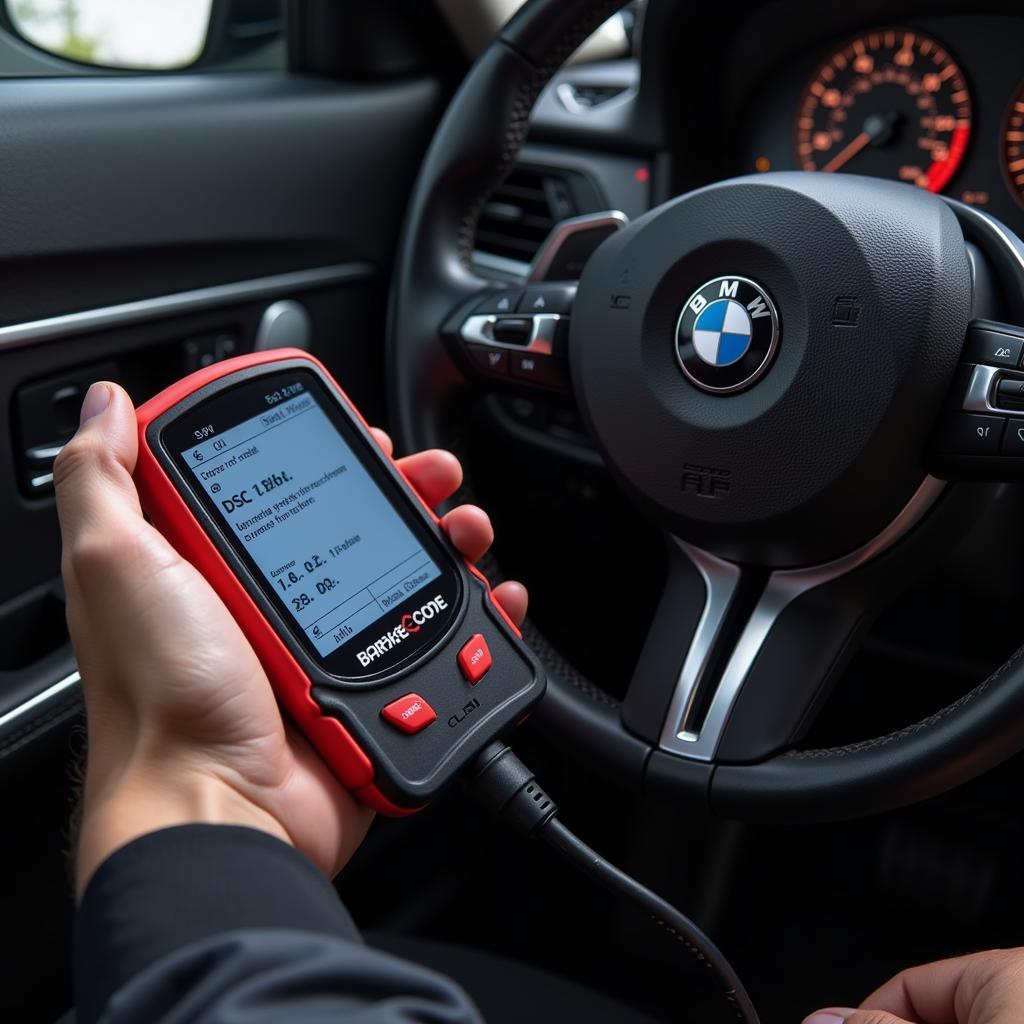The BMW 3 Series is renowned for its performance and driving dynamics, but encountering the dreaded DSC (Dynamic Stability Control) and brake warning light can be a cause for concern. This article delves into the common causes behind these warning lights illuminating simultaneously on your BMW 3 Series and provides insights into possible solutions.
Understanding the Warning Lights
Before we delve into the causes, it’s crucial to understand what these warning lights signify. The DSC light, often depicted as a car with skid marks, indicates an issue with the vehicle’s stability control system. This system helps maintain traction and prevent skids or spins, especially during challenging driving conditions. The brake warning light, typically a red circle with an exclamation mark, signifies a problem within the braking system itself.
When both lights illuminate simultaneously, it suggests a potential link between the two systems. It’s essential not to ignore these warnings as they can compromise your safety and the vehicle’s handling.
Common Causes and Troubleshooting
1. Faulty Wheel Speed Sensors
Wheel speed sensors play a critical role in both the DSC and braking systems. These sensors monitor the rotational speed of each wheel, providing data to the vehicle’s control modules. A malfunctioning sensor can disrupt these systems, triggering both warning lights.
Solution: Diagnosing a faulty wheel speed sensor requires scanning the vehicle’s computer for error codes. A qualified technician can pinpoint the problematic sensor and replace it to restore proper system functionality.
2. Brake Fluid Issues
Brake fluid, being hygroscopic, absorbs moisture over time. This contamination can reduce its effectiveness and potentially lead to brake system issues that impact the DSC as well.
Solution: Checking your brake fluid level and condition regularly is crucial. If the fluid appears dark, contaminated, or below the minimum level, it’s essential to have it flushed and replaced by a qualified mechanic.
3. Steering Angle Sensor Malfunction
The steering angle sensor determines the position of the steering wheel and relays this information to the DSC system. A malfunctioning sensor can lead to inaccurate readings, causing the system to behave erratically.
Solution: Similar to other sensors, diagnosing a faulty steering angle sensor involves scanning the vehicle for error codes. If detected, replacing the sensor is typically necessary.
4. Issues with the DSC Control Module
In some cases, the DSC control module itself may be the culprit. This module acts as the brain of the stability control system, processing data from various sensors and controlling the system’s operation.
Solution: A malfunctioning DSC module often requires specialized diagnostic equipment. A qualified technician can determine if the module needs replacement or reprogramming.
 A mechanic connecting a diagnostic scanner to a BMW 3 Series
A mechanic connecting a diagnostic scanner to a BMW 3 Series
5. Worn Brake Pads or Rotors
While less common, significantly worn brake pads or rotors can also trigger these warning lights. This is because the worn components affect the braking system’s performance, which can indirectly impact the DSC’s operation.
Solution: Regular brake inspections are crucial to monitor pad and rotor wear. If they are nearing the end of their service life, replacing them is essential for optimal braking performance and to prevent potential DSC-related issues.
Remote Diagnostic and Programming Solutions
Advancements in automotive technology have paved the way for remote diagnostic and programming solutions. These services allow qualified technicians to access your BMW 3 Series’s computer system remotely, retrieve error codes, and even perform software updates or programming if necessary. This can be a convenient option for initial diagnosis and potentially resolving software-related issues without visiting a physical workshop.
Expert Insights
“It’s crucial to remember that the DSC and braking systems are intertwined,” says Mark Johnson, a seasoned BMW technician. “Ignoring these warning lights can lead to more significant issues and potentially compromise your safety. Early diagnosis and addressing the root cause is key to ensuring optimal vehicle performance and safety.”
Conclusion
Encountering the DSC and brake warning lights on your BMW 3 Series can be disconcerting, but understanding the potential causes empowers you to take appropriate action. By addressing the issue promptly and seeking professional assistance when needed, you can ensure your BMW 3 Series remains a safe and enjoyable driving machine. Remember, regular maintenance and timely repairs are vital for preventing future issues and enjoying the performance your BMW is known for.
FAQs
1. Can I still drive my BMW 3 Series with the DSC and brake warning lights on?
While it’s not advisable, you may still be able to drive your BMW 3 Series for a short distance. However, it’s crucial to exercise extreme caution and seek immediate professional diagnosis and repair to avoid potential safety hazards.
2. How much does it typically cost to fix DSC and brake warning light issues?
The repair costs can vary significantly depending on the underlying cause. Sensor replacements are generally less expensive, while module replacements or complex electrical issues can be more costly. It’s always recommended to obtain a proper diagnosis and quote from a reputable BMW specialist.
3. Can I check and replace the wheel speed sensors myself?
While some DIY enthusiasts may attempt it, it’s generally recommended to leave sensor replacements to qualified technicians. They have the expertise and tools to ensure proper installation and calibration, which are crucial for the sensors to function accurately.
4. How often should I have my BMW 3 Series’s brake fluid flushed?
BMW recommends having your brake fluid flushed every two years or as specified in your vehicle’s service schedule. Regular flushing helps maintain optimal brake system performance and prevents moisture contamination.
5. Can a low battery trigger DSC and brake warning lights?
While less likely, a severely low battery can sometimes disrupt the operation of various vehicle systems, potentially including the DSC and braking systems. It’s essential to ensure your battery is in good condition and adequately charged.

